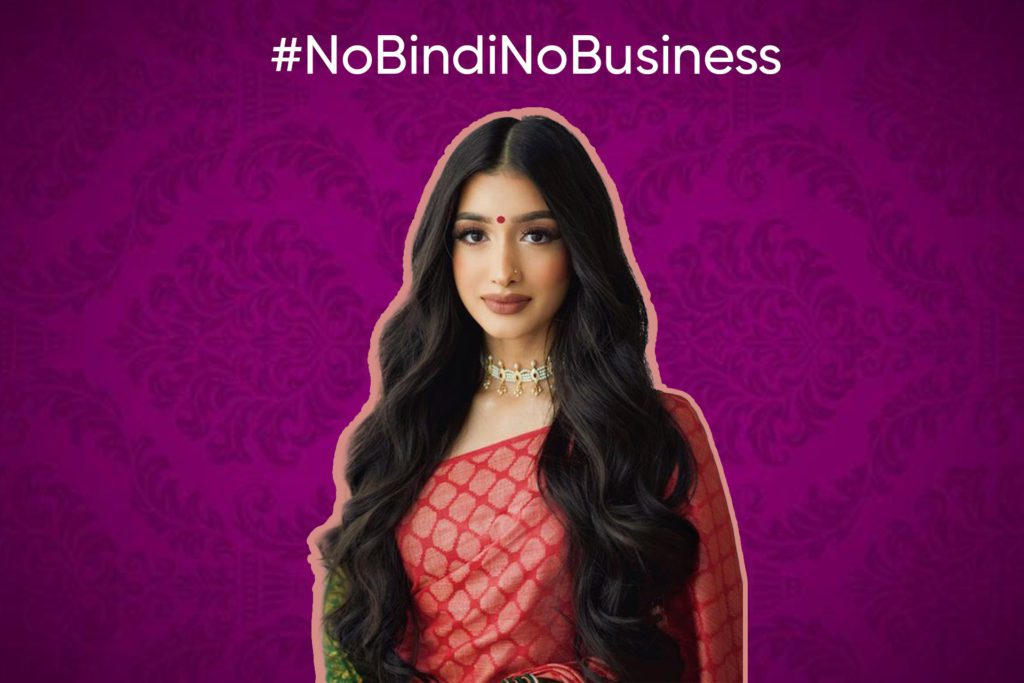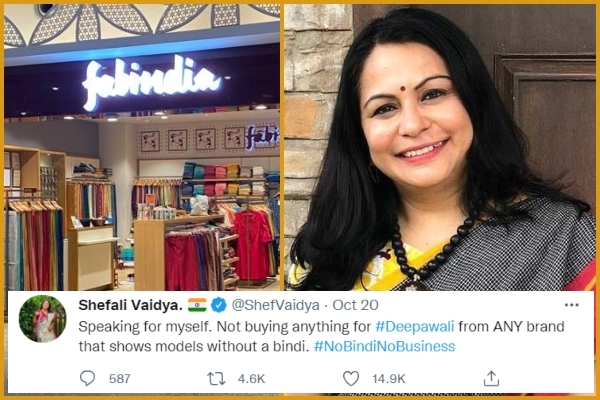Social media today has become a potent tool for mobilising communities and sparking change. The #NoBindiNoBusiness movement that stemmed through social media has emerged as a significant force in reshaping advertisements by major brands. This movement is a response to the negative portrayal of Hindu traditions in the media and is dedicated to preserving the cultural significance of the bindi in Hindu culture. Over time, it has garnered substantial support on social media platforms, leading to significant impacts on how big brands approach their advertising strategies.

The Significance of the Bindi in Hindu Culture
The bindi holds immense significance in Hindu culture. Derived from the Sanskrit term Bindu, meaning a drop or particle, the bindi is worn by Hindu women, typically on their foreheads. It symbolises their spiritual roots and is closely associated with the Ajna chakra, often referred to as the third eye chakra. While the bindi has evolved to come in various colours and designs in modern times, its fundamental importance for Hindu women remains the same.
The Emergence of the #NoBindiNoBusiness Campaign
The #NoBindiNoBusiness movement was born out of the need to counter the whitewashing of Hindu traditions by major corporations, particularly in their Diwali advertisements last year. It was brought to the forefront by the vigilance of individuals like blogger Shefali Vaidya, who noticed a troubling pattern. Major clothing brands were featuring models without bindis in their advertisements, even when promoting products specific to Hindu festivals like Diwali. It was felt like these were deliberate omissions that were aimed to erase the symbolic importance of the bindi for Hindu women and consumers alike.
Did not expect this from @NalliSilk.
— Kamal Vedā / कमल वेदा (@iKamalVeda) October 18, 2023
Where is the Bindi? #NoBindiNoBusiness pic.twitter.com/NmydqXydF9
This year the campaign resurfaced after an advertisement from popular Silk sarees chain Nalli Silks. The brand released an advertisement to highlight their new festive collection for the upcoming season. The model promoting the brand was seen wearing a gorgeous yellow saree paired with a bright pink blouse. She did not wear a Bindi along with her attire, causing stir on social media. Nalli Silks withdrew the commercial and released a new one in which actress Soni Srivastava was seen wearing a Bindi and jewellery to celebrate the upcoming festival.
Also Read: Phone That Bends Into A Watch? Motorola Introduces A New Bendable Phone
The Impact of the #NoBindiNoBusiness Campaign
The #NoBindiNoBusiness campaign gained momentum on social media platforms and became a rallying point for those who sought to preserve the cultural and spiritual significance of the bindi. This grassroots movement effectively utilised the power of social media to raise awareness about the issue. It drew attention to the way big brands were failing to respect and acknowledge the cultural depth and importance of the bindi.
The strength of #NoBindiNoBusiness Campaign
One striking achievement of the campaign’s impact was its influence on the clothing brand Fab India. When Fab India released its Diwali collection named ‘Jashn-e-Riwaaz,’ it faced backlash from the #NoBindiNoBusiness movement and its supporters. The campaign pressured Fab India to change the collection’s name to ‘Jhilmil Si Diwali.’
While the brand made this adjustment, it notably did not include bindis on the female models in their advertisements. This incident underscores the ongoing need for continued vigilance and activism by the movement’s supporters. Thereby resulting in the continuation of the movement even this year where the brands have been more careful about the portrayal of cultures and traditions in their advertisements.

Positive Role Models in Advertising
As the #NoBindiNoBusiness campaign continues to make its mark on the advertising industry, it has also brought attention to brands that are actively promoting cultural diversity and respect. Local brands from Maharashtra have been praised for portraying women with bindis in their advertisements, aligning with the true spirit of Hindu festivals and respecting the cultural significance of the bindi.
The #NoBindiNoBusiness movement has become a powerful force in the world of advertising, highlighting the importance of respecting and preserving cultural traditions in the face of negative portrayals in the media. By raising awareness and mobilising support on social media, the movement has successfully influenced how some major brands approach their advertising strategies. It serves as a reminder that cultural sensitivity and inclusivity should be paramount in the landscape of advertising and marketing. The impact of this movement showcases the growing influence of social media activism in shaping the way brands interact with and represent diverse cultures and communities.


